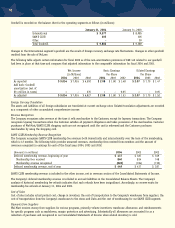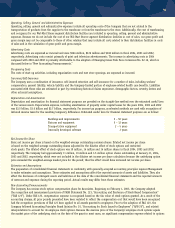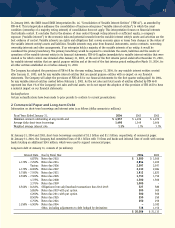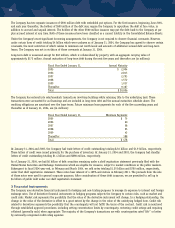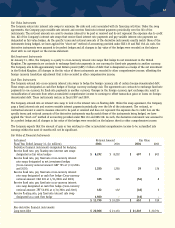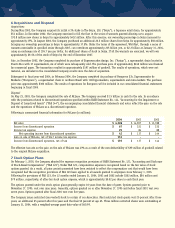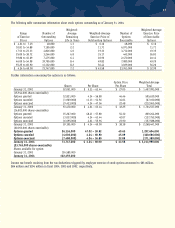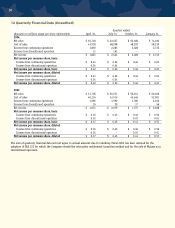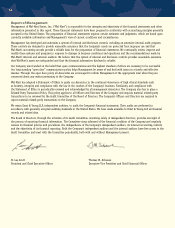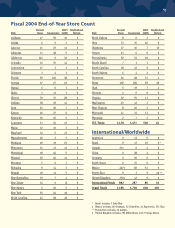Walmart 2004 Annual Report Download - page 48
Download and view the complete annual report
Please find page 48 of the 2004 Walmart annual report below. You can navigate through the pages in the report by either clicking on the pages listed below, or by using the keyword search tool below to find specific information within the annual report.
46
6 Acquisitions and Disposal
Acquisitions
During May 2002, the Company acquired its initial 6.1% stake in The Seiyu, Ltd. (“Seiyu”), a Japanese retail chain, for approximately
$51 million. In December 2002, the Company exercised in full the first in the series of warrants granted allowing us to acquire
192.8 million new shares in Seiyu for approximately $432 million. After this exercise, our ownership percentage in Seiyu increased to
approximately 35%. In August 2003, the Company purchased an additional 20.2 million shares from Seiyu for approximately $38 million,
bringing our ownership percentage in Seiyu to approximately 37.8%. Under the terms of the agreement, Wal-Mart, through a series of
warrants exercisable in specified series through 2007, can contribute approximately 235 billion yen, or $2.2 billion at January 31, 2004,
using an exchange rate of 105.7 yen per dollar, for additional shares of stock in Seiyu. If all the warrants are exercised, we will own
approximately 69.4% of the stock of Seiyu by the end of December 2007.
Also, in December 2002, the Company completed its purchase of Supermercados Amigo, Inc. (“Amigo”), a supermarket chain located in
Puerto Rico with 37 supermarkets, six of which were subsequently sold. The purchase price of approximately $242 million was financed
by commercial paper. The transaction resulted in approximately $197 million of goodwill. The results of operations, which were not
material, are included in the consolidated Company results since the date of acquisition.
Subsequent to fiscal year-end 2004, in February 2004, the Company completed its purchase of Bompreco S.A. Supermercados do
Nordeste (“Bompreco”), a supermarket chain in northern Brazil with 118 hypermarkets, supermarkets and mini-markets. The purchase
price was approximately $300 million. The results of operations for Bompreco will be included in our consolidated financial statements
beginning in fiscal 2005.
Disposal
On May 23, 2003, the Company completed the sale of McLane. The Company received $1.5 billion in cash for the sale. In accordance
with the provisions related to discontinued operations specified within FASB Statement No. 144, “Accounting for the Impairment or
Disposal of Long-Lived Assets” (“FAS 144”), the accompanying consolidated financial statements and notes reflect the gain on the sale
and the operations of McLane as a discontinued operation.
Following is summarized financial information for McLane (in millions):
2004 2003 2002
Net sales $ 4,328 $ 14,907 $ 13,788
Income from discontinued operation $67 $ 221 $ 232
Income tax expense 25 84 88
Net operating income from discontinued operation $42 $ 137 $ 144
Gain on sale of McLane, net of $147 income tax expense 151 ––
Income from discontinued operation, net of tax $ 193 $ 137 $ 144
The effective tax rate on the gain on the sale of McLane was 49% as a result of the non-deductibility of $99 million of goodwill related
to the original McLane acquisition.
7 Stock Option Plans
On February 1, 2003, the Company adopted the expense recognition provisions of FASB Statement No. 123, “Accounting and Disclosure
of Stock-Based Compensation” (“FAS 123”). Under FAS 123, compensation expense is recognized based on the fair value of stock
options granted. As a result, all prior periods presented have been restated to reflect the compensation cost that would have been
recognized had the recognition provisions of FAS 123 been applied to all awards granted to employees since February 1, 1995.
Following the provisions of FAS 123, the 12 months ended January 31, 2004, 2003 and 2002 include $102 million, $84 million and
$79 million, respectively, of after-tax stock option expense, which is approximately $0.02 per share in each fiscal year.
The options granted under the stock option plans generally expire 10 years from the date of grant. Options granted prior to
November 17, 1995, vest over nine years. Generally, options granted on or after November 17, 1995 and before fiscal 2001 vest over
seven years. Options granted after fiscal 2001 vest over five years.
The Company issues restricted (non-vested) stock to certain of our Associates. Most restricted stock grants vest 25 percent after three
years, an additional 25 percent after five years and the final 50 percent at age 65. Three million restricted shares were outstanding at
January 31, 2004, with a weighted-average grant date value of $40.99.




